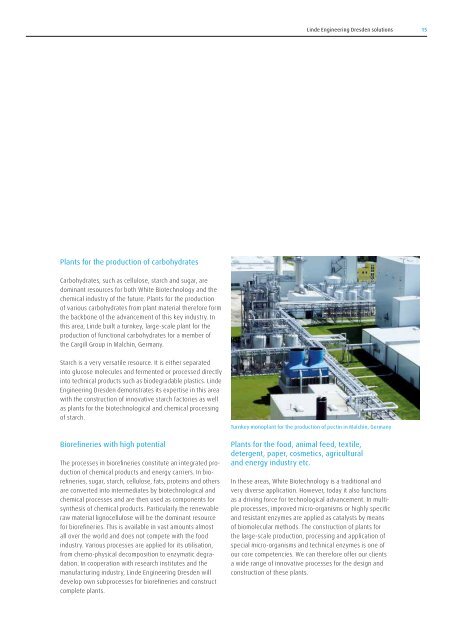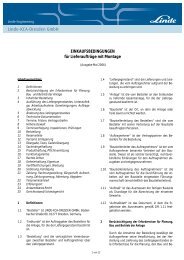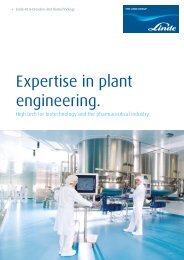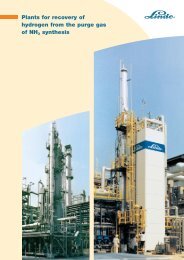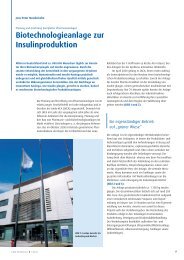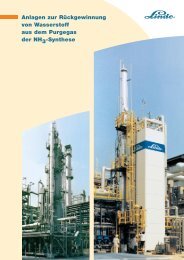PDF Image Brochure - Linde Engineering Dresden GmbH
PDF Image Brochure - Linde Engineering Dresden GmbH
PDF Image Brochure - Linde Engineering Dresden GmbH
You also want an ePaper? Increase the reach of your titles
YUMPU automatically turns print PDFs into web optimized ePapers that Google loves.
Plants for the production of carbohydrates<br />
Carbohydrates, such as cellulose, starch and sugar, are<br />
dominant resources for both White Biotechnology and the<br />
chemical industry of the future. Plants for the production<br />
of various carbohydrates from plant material therefore form<br />
the backbone of the advancement of this key industry. In<br />
this area, <strong>Linde</strong> built a turnkey, large-scale plant for the<br />
production of functional carbohydrates for a member of<br />
the Cargill Group in Malchin, Germany.<br />
Starch is a very versatile resource. It is either separated<br />
into glucose molecules and fermented or processed directly<br />
into technical products such as biodegradable plastics. <strong>Linde</strong><br />
<strong>Engineering</strong> <strong>Dresden</strong> demonstrates its expertise in this area<br />
with the construction of innovative starch factories as well<br />
as plants for the biotechnological and chemical processing<br />
of starch.<br />
Biorefineries with high potential<br />
The processes in biorefineries constitute an integrated production<br />
of chemical products and energy carriers. In biorefineries,<br />
sugar, starch, cellulose, fats, proteins and others<br />
are converted into intermediates by biotechnological and<br />
chemical processes and are then used as components for<br />
synthesis of chemical products. Particularly the renewable<br />
raw material lignocellulose will be the dominant resource<br />
for biorefineries. This is available in vast amounts almost<br />
all over the world and does not compete with the food<br />
industry. Various processes are applied for its utilisation,<br />
from chemo-physical decomposition to enzymatic degradation.<br />
In cooperation with research institutes and the<br />
manufacturing industry, <strong>Linde</strong> <strong>Engineering</strong> <strong>Dresden</strong> will<br />
develop own subprocesses for biorefineries and construct<br />
complete plants.<br />
<strong>Linde</strong> <strong>Engineering</strong> <strong>Dresden</strong> solutions<br />
Turnkey monoplant for the production of pectin in Malchin, Germany<br />
Plants for the food, animal feed, textile,<br />
detergent, paper, cosmetics, agricultural<br />
and energy industry etc.<br />
In these areas, White Biotechnology is a traditional and<br />
very diverse application. However, today it also functions<br />
as a driving force for technological advancement. In multiple<br />
processes, improved micro-organisms or highly specific<br />
and resistant enzymes are applied as catalysts by means<br />
of biomolecular methods. The construction of plants for<br />
the large-scale production, processing and application of<br />
special micro-organisms and technical enzymes is one of<br />
our core competencies. We can therefore offer our clients<br />
a wide range of innovative processes for the design and<br />
construction of these plants.<br />
15


